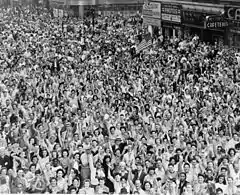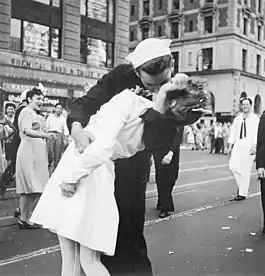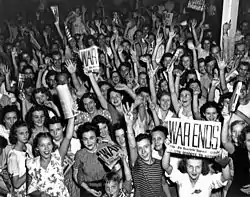Victory Day (United States)
Victory Day is a holiday observed in the United States state of Rhode Island with state offices closed on the second Monday of August. Furthermore, in 2017, WPRI-TV claimed that Arkansas (which stopped celebrating the day in 1975) and Rhode Island were the only two states to ever celebrate the holiday, though Arkansas's name for the holiday was "World War II Memorial Day."[1]
| Victory Day | |
|---|---|
 Crowds celebrating V-J Day in Times Square | |
| Also called | Victory Over Japan Day, VJ Day, World War II Memorial Day (Arkansas)[1] |
| Observed by | United States (Rhode Island, U.S. Space & Rocket Center[2]) |
| Type | (1) Rhode Island state holiday, state offices closed (2) Space Center commemoration |
| Date | (1) Second Monday in August (Rhode Island and US Space & Rocket Center) (2) August 14 (Rhode Island, 1948-1966[1]) |
| 2020 date | August 10 |
| 2021 date | August 9 |
| 2022 date | August 8 |
| 2023 date | August 14 |
| Frequency | annual |
Originally, the official name was "Victory over Japan Day" and "V-J Day", as proclaimed by then President Harry S. Truman and was officially observed on September 2 nationwide. At some point, the name was changed to "Victory Day" in light of the modern post-war Japan emerging in economic importance. Further name changes were attempted later, but were unsuccessful, at which point, the name "Victory Day" remained the official name.
The holiday celebrates the conclusion of World War II and is related to Victory over Japan Day in the United Kingdom. Rhode Island retains the holiday in tribute to the number of sailors it sent and lost in the Pacific front. More than one in ten of the states residents had served in the war, and 2,340 (671 Navy or Marines)[3] had been killed. In 2015,[4] the Space and Rocket Center in Huntsville, Alabama honored 500 veterans on the 70th anniversary of the end of the war.[5]
History

Victory Day has commemorated the anniversary of Japan’s surrender to the Allies in 1945 which ended World War II. The atomic bombs dropped on Hiroshima on August 6 and Nagasaki on August 9, and the Soviet Union’s invasion of Manchuria in the previous week led to the eventual surrender. President Truman's announcement of the surrender started mass celebrations across the United States, which was when he declared September 2 as the official "VJ Day" in 1945. In 1975, the holiday was abolished at the Arkansas state level leaving Rhode Island as the only state in the U.S. where the holiday is a legal holiday.[1] Rhode Island has observed this day since 1948. Initially observed on August 14, the Rhode Island General Assembly enacted legislation in 1966 to observe the holiday on the second Monday in August annually.[1]
According to WPRI-TV, Rhode Island has had debates over whether to retain the state holiday, with opponents citing Japan's growing "economic might" in the 1980s and offense to Japanese Americans, but all efforts to remove or rename the holiday have been defeated by "veterans and traditionalists," as well as labor unions.[1]
References

- Nesi, Ted (August 13, 2017). "Here's why Rhode Island is the only state that observes Victory Day". WPRI-TV. Retrieved February 18, 2020.
- "Victory Day Celebration".
- "World War II Casualty Cards, 1941-1945 | Rhode Island Department of State ArchivesSpace". catalog.sos.ri.gov. Retrieved 2021-01-20.
- "Victory Day".
- "'Uncommon valor' of World War II veterans celebrated in Victory Day 2015 event".